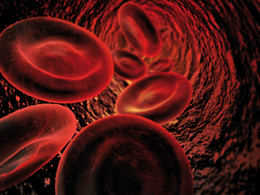Mending broken hearts - Consuming oily fish could repair damaged blood vessels
Release Date 13 February 2015

Eating oily fish may not only keep your heart healthy but it could actually help to fix damaged blood vessels faster, reducing your risk of cardiovascular disease, University of Reading scientists have found.
It is well know that these high in omega-3 fatty acid foods can improve the elasticity of blood vessels and potentially protect against heart disease. However the reasons for these positive effects are less clear. This study tested two new emerging markers of cardiovascular disease that are of particular interest to researchers in the quest for answers.
The first was endothelial progenitor cells (EPCs), stem cells made in the bone marrow that repair the linings of blood vessels when they become damaged. Previous studies associate a higher number of EPCs with a lower risk of heart disease.
Over a period of eight weeks the researchers introduced small amounts (3 g per day) of fish oils to a volunteer group of people with mild risk of cardiovascular risk of a mixed age range. At the end of the eight weeks this study group increased their EPCs numbers by up to 15% compared to a control group.
The second marker, endothelial microparticles (EMPs), are tiny circular vesicles which are shed when the lining of blood vessels is damaged. High numbers of these indicates a high degree of blood vessel damage and are associated with higher risk of heart disease. At the end of the trial, the group consuming the oily fish decreased EMPs by 20% compared to the control group.
Professor Parveen Yaqoob, from the University of Reading's Department of Food and Nutritional Sciences, conducted the study. She said: "In this country alone seven million people live with cardiovascular disease. Every six minutes someone in the UK dies of a heart attack. Many of these deaths may be prevented by the right lifestyle, including diet.
"Fish oil is known to increase the release of nitric oxide from the lining of the blood vessel wall which causes relaxation of the vessel and increases blood flow. Our study shows that fish oils could be better for our heart in more ways than previously thought, decreasing damage to the lining of blood vessels and by increasing the numbers of cells which repair those linings.
"It also offers crucial new insight into exactly why oily fish is good for our health. Unlike the routine markers of cardiovascular disease such as cholesterol, EPCs and EMPs are cellular markers. They are notoriously difficult to measure so very little robust research has been conducted on them until now. Both are of great interest because we know where the cells are coming from and what they might be doing in the blood vessels. This means that we can try to find ways to target them to improve blood vessel health."
Fish-oil supplementation alters numbers of circulating endothelial progenitor cells and microparticles independent of eNOS genotype was published in American Journal of Clinical Nutrition
